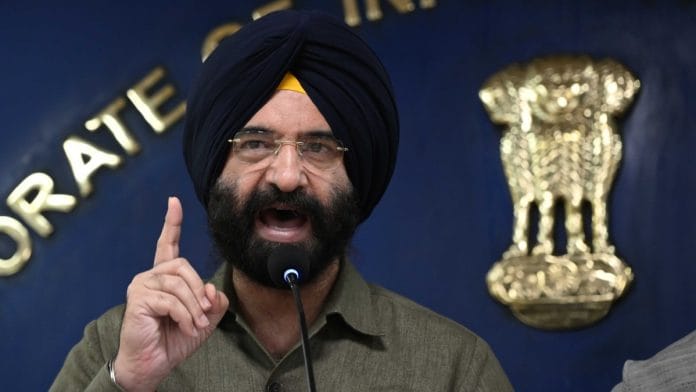New Delhi: In the face of backlash over the move, Delhi Environment Minister Manjinder Singh Sirsa has requested the Commission for Air Quality Management (CAQM) to pause its new directive denying fuel to petrol vehicles older than 15 years and diesel vehicles older than 10 years, two days after the order was implemented in the national capital.
In a letter dated 3 July, the minister said that while the Delhi government complies with the CAQM’s plan to phase out old, polluting vehicles, the current policy to deny fuel to these vehicles is not feasible due to operational challenges. “Because of technological inconsistencies and lack of integration with neighbouring states … there is public discontent and outcry,” read the letter.
The policy introduced by the CAQM mandated that around 61 lakh end-of-life (EoL) vehicles identified in Delhi will not be allowed to ply on the capital’s roads. The vehicles will be identified by an Automatic Number Plate Recognition (ANPR) camera system at all fuel stations and denied fuel across Delhi, and also stand to be impounded by the police. This policy was expected to extend to NCR regions including Gurgaon, Faridabad, and Noida by November.
The measure was met with backlash by a section of citizens who took to social media to complain about classifying petrol vehicles older than 15 years and diesel vehicles older than 10 years as ‘unfit’ for Delhi’s roads.
62 lakh vehicles banned from fuel overnight in Delhi. No proper EV infra, no affordable alternatives, just pressure on middle class families.
Even well-maintained cars face the axe!
This isn’t saving the planet, it’s wrecking livelihoods!! ?♂️
— Karan Singh Dhillon (@karandhillon28) July 1, 2025
So, Delhi has banned fuel stations from refuelling 15-year-old petrol and 10-year-old diesel vehicles starting today.
Great for headlines, but what about those who can’t afford a new car or EV? Poor scrappage support, no exchange offers, no EV infrastructure! Just a sudden ban.… pic.twitter.com/EhgJxkq3oe
— Arun Prabhudesai (@8ap) July 1, 2025
As a result, the Delhi minister in his letter to the statutory body wrote that “immediate implementation of the directive may be premature and potentially counterproductive”.
The main issues pointed out in the letter were to do with the implementation of the policy, which relies on ANPR systems to recognise the vehicles. The letter said that these ANPR systems have potential glitches, and the camera placement too was not viable.
Also, the minister pointed out that “the system is not yet fully integrated into the databases of neighbouring states”.
What this would lead to, said the letter, is people getting fuel from nearby NCR regions for their EoL vehicles rather than taking them off the roads.
“A stage-wise implementation system will not serve its purpose …. It is highly to lead vehicle owners procuring fuel from adjacent districts, circumventing the ban and fostering an illegal cross-border market for fuel,” read the letter.
The initial order (Direction 89) to deny fuel to end-of-life polluting vehicles by 1 July was passed by CAQM on 23 April this year. The move had been earlier announced by Delhi Environment Minister Manjinder Sirsa, who said it would come into force from 31 March, but it was pushed to ensure more time for fuel stations to be equipped with ANPR cameras.
The order to deny fuel to EoL vehicles from plying on Delhi’s roads came after numerous advisories and directions by the National Green Tribunal (NGT), the Supreme Court, Union Ministry of Environment, Forests and Climate Change, and the Delhi government in a bid to reduce air pollution.
However, in the letter, Sirsa mentioned that the Delhi government has existing and ongoing measures to curb pollution, such as planting 70 lakh trees, strengthening the pollution certificate (PUC) regime for vehicles, and cloud seeding measures. “We are confident that the ongoing multipronged efforts of the Delhi government will achieve substantial improvements in air quality,” read his letter to the CAQM.
(Edited by Amrtansh Arora)
Also Read: Delhi’s new fuel policy is forcing people to buy new cars. It won’t reduce pollution







The policy is good for environment. But govt should give tax rebates on new vehicles, to lessen the economic burden, on the affected.